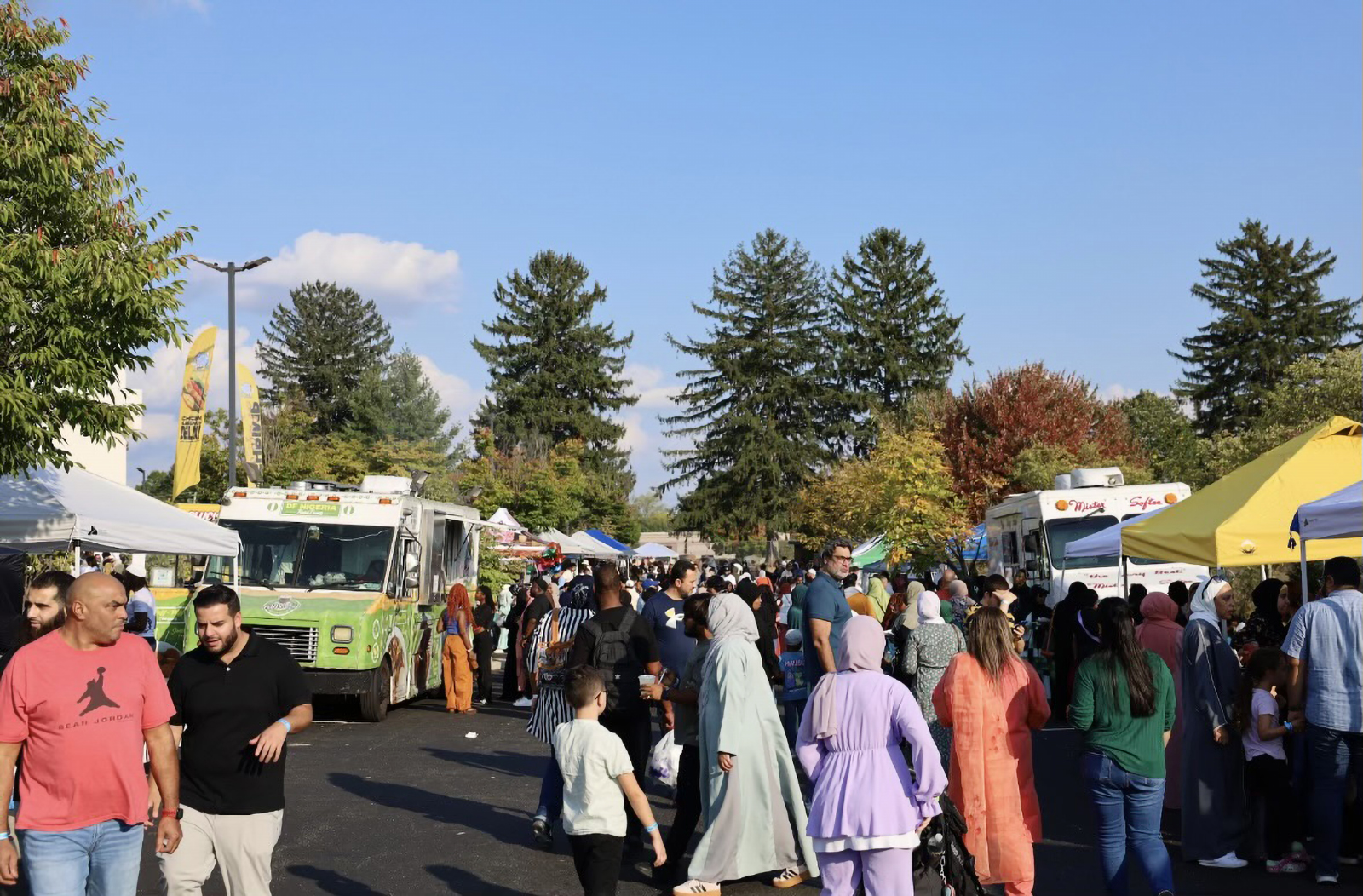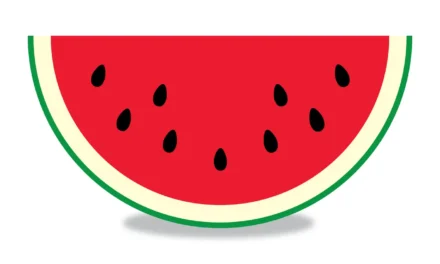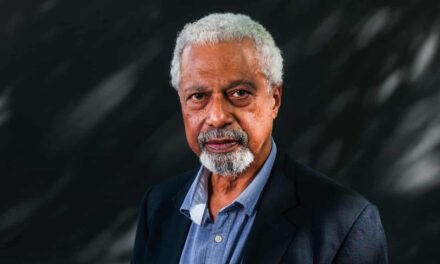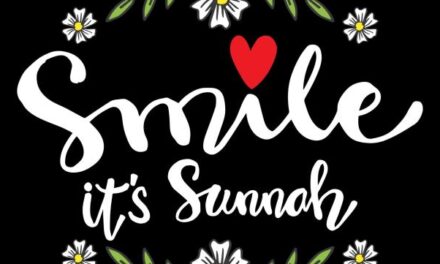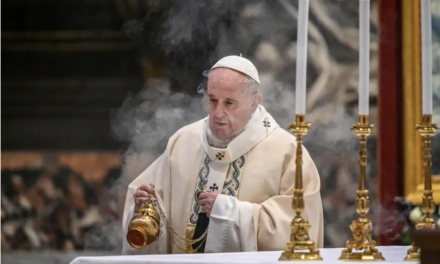People attend the Philly Halal Food Festival on Sept. 21, 2024, in Phoenixville, Pa. (Photo by Rhonda Roumani)
PHILADELPHIA (RNS) — Reuben Harley, more commonly known as Big Rube, owner of Chef Big Rube’s Kitchen in northwest Philadelphia, was tending to the smoked beef sandwiches, brisket and chicken on his grill late last month at the second annual Philly Halal Food Festival, a celebration of Philadelphia’s Muslim community held in the suburb of Phoenixville.
Harley calls his food “the original cuisine of America, Black homestyle cooking that our ancestors made out of struggle.” He also says it is every bit as Muslim.
“The Muslim part is part of everything,” said Harley. “My purveyor is Prime Halal on 23rd and Lombard. I only use halal products. My beef, my chicken, everything, you know the meat was raised right and slaughtered in an Islamic way, and that’s how I lead my life — right. And people in Philly know about Muslim culture. It’s not just Muslims who know. They all know.”
The festival, which has drawn more than 6,000 people on a September weekend, is a microcosm of the varied Muslim communities in and around Philadelphia. “We are a very diverse community, but we stick to our own bubbles, right?” said Noor Bowman, 23, a native Philadelphian who founded the event with Tabish Hoda, a physician who launched the Instagram account Philly Halal Spots, and Najah Siddiq, a Philly native who works in project management.
“The Arabs are here, Desis are here, African Americans are here. When it comes to picking vendors, we’re very intentional,” said Bowman, scanning stalls selling Uzbek kebabs, Nepali dumplings as well as halal cheesesteak. “We’re like, we need the Africans. We need the Uzbeks. And that’s what you’re seeing here. There’s literally every kind of masjid, every kind of community, different sects of Islam. At the end of the day, we’re all Muslim, and that’s what this is about for us.”
They are also, like Big Rube, all American. Among the more than 80 vendors under tents are Athani Wear, advertised as the first Muslim-owned sneaker brand in the U.S., and Salaam Cola, whose tagline is “taste the freedom.” (Coca-Cola is on the list of boycotted brands in the Boycott, Divestment, Sanctions movement, which aims to pressure Israel over its treatment of Palestinians.)
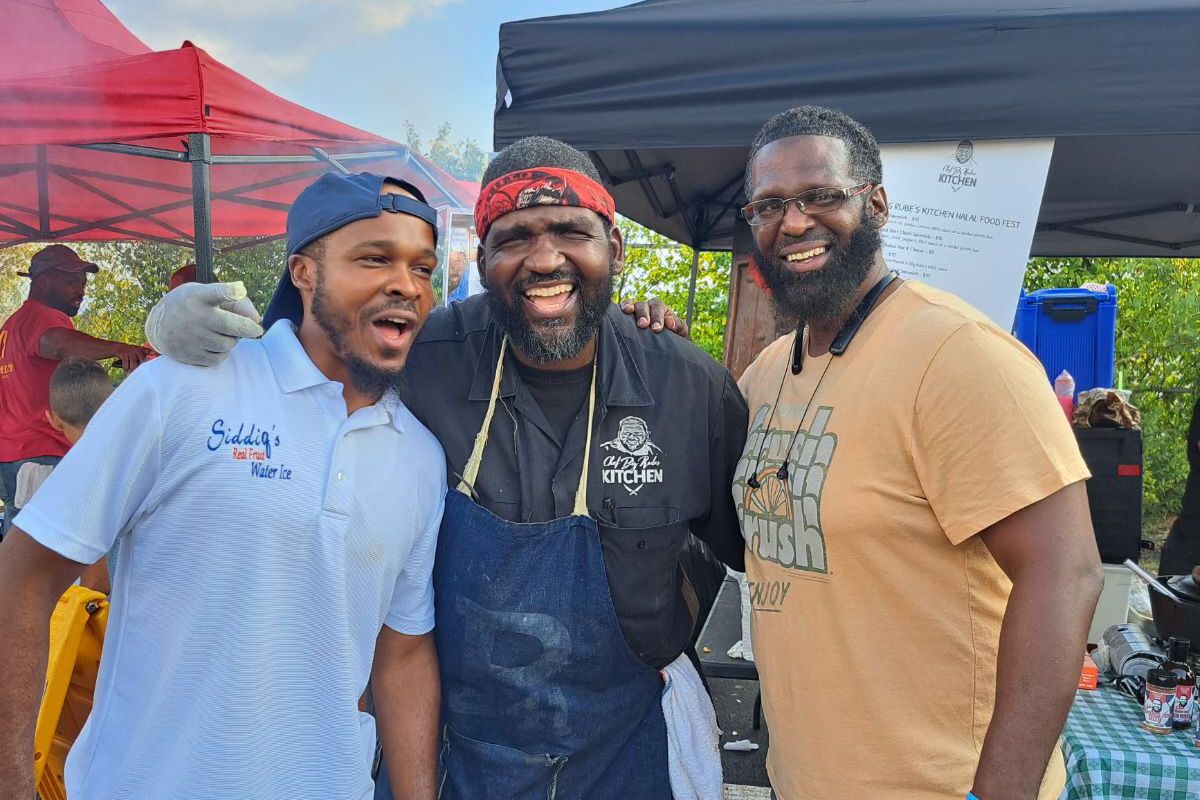
Michigan’s Dearborn and Detroit, and Patterson, New Jersey, and even New York, all cities with large Arab populations, are often cited as the hubs of Muslim culture in the United States. But Philadelphia can stake its own claim as a quintessential American Muslim city. While other cities’ Muslims comprise mostly immigrants with smaller pockets of African Americans, in Philadelphia, the situation is reversed. The majority-minority city’s Muslims are predominantly Black Americans, with growing pockets of immigrant communities, including Palestinians, Bangladeshis, Uzbeks, who represent the diverse world of Islam. That, locals believe, creates a city with a distinct Muslim feel.
“Because Black Muslims are indigenous and happen to be the majority in Philadelphia, there’s a lot more integration between the city and culture of the Muslims in Philadelphia,” said Hoda. “Islam and American Islam is culturally understood more than in other cities.”
The city also has an increasingly visible Muslim political establishment that includes state Sen. Sharif Street, the head of Pennsylvania’s Democratic Party and son of former Mayor John F. Street (who was not Muslim). Sylvester Johnson, police commissioner from 2022-2008, is a Muslim, as are City Councilman Curtis Jones Jr., City Commissioner Omar Sabir, state Rep. Tarik Khan and Gov. Josh Shapiro’s secretary of policy and planning, Akbar Hossain.
“Philly was one of the pioneers in making Islam accepted in the United States,” explained Shahadah Abdul-Rashid, a community initiatives specialist with the Free Library of Philadelphia who helped create a community project in 2022 called In the Path of Islam to highlight indigenous Philadelphia Muslim voices and art. Abdul-Rashid’s father, Imam Asim Abdur-Rashid, was a leader in the grassroots Dar-ul Islam movement.
“In Philly right now,” said Abdul-Rashid, “no one will look at you strange if you wear a hijab or a niqab or a full burqa or any combination of this sort.”
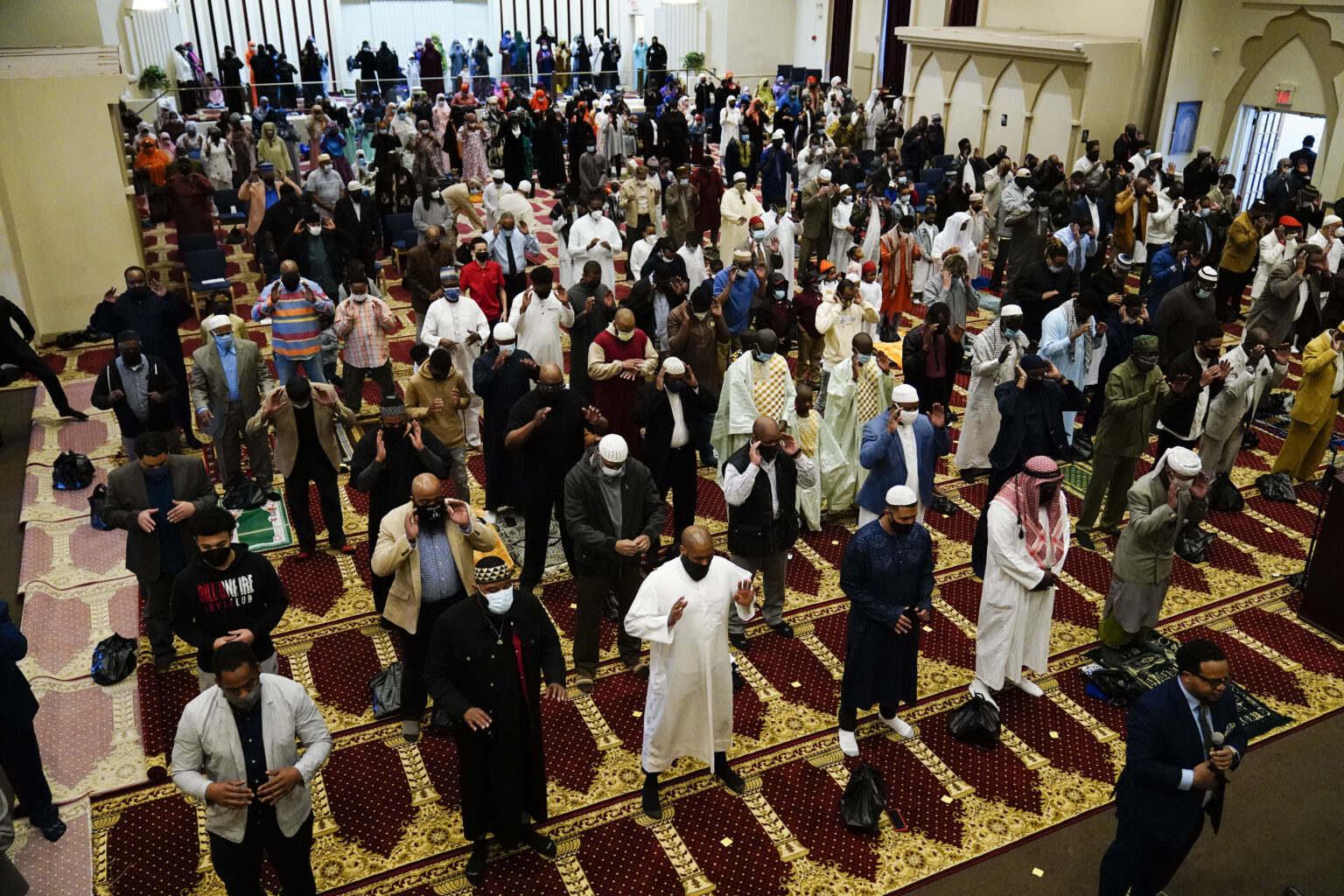
Worshippers perform an Eid al-Fitr prayer at the Masjidullah Mosque in Philadelphia, May 13, 2021. (AP Photo/Matt Rourke, File)
Muslim habits have infiltrated non-Muslim street fashions in the city. The Philly beard, also known as the Sunni beard or the Philly Sunni, became popular in the early 2000s, then popped up on popular hip-hop artists. The short pants that emulate a practice of the Prophet Muhammad, and the jalbab or lungi or izar — long robes worn by both women and men — can’t be taken as an indicator of their wearers’ faith. Even words like “Assalamu Alaikum” (Peace be upon you) and “Insha’Allah” (God willing) or “wallahi” (I swear) have become a part of Philadelphia’s everyday lexicon.
Philadelphia’s vibrant, self-aware Muslim — and Black Muslim— culture also stands at the center of this year’s presidential election. As the race tightens and the election nears, more and more people are watching what will happen in Pennsylvania, whose 19 Electoral College votes make it the largest swing state. The Muslim vote in Philadelphia, estimated at nearly 300,000 strong, is one of the key blocs said to be likely to determine the next president of the United States: In 2020, Muslims went strongly for Joe Biden, who won the state by just 80,000 popular votes.
Philadelphia’s community reflected Muslim voters nationwide. A 2022 report from Emgage, a Muslim advocacy organization that aims to “educate and mobilize Muslim American voters,” estimated that 65% of Muslim voters turned out for Biden. In Michigan, where Biden won by a little more than 150,000 votes, more than 206,050 Muslims were registered to vote. In Georgia, which Biden won by 12,000 votes, more than 61,000 Muslims showed up to the polls.
But at the halal festival, Big Rube said he doesn’t identify as a Democrat or Republican and that he definitely won’t be voting for Vice President Kamala Harris. “Democrats, they go out their way to say, ‘We need a so-called Black vote, but they do nothing for the vote in return. You know, every group gets something for their vote except us. They have us voting out of fear. The politicians go out their way to the masjid to get the Muslim vote, but I don’t really buy it.”
The mistrust is particularly evident this year among Muslims with connections to the Mideast. Naseema Abuali, who sold embroidered Palestinian thobes and kaffiyehs at the fair, is part of a large Palestinian community in Philadelphia. “They’re killing our people,” said Abuali, who says she’s planning to vote for Green Party nominee Jill Stein. “It just doesn’t feel right to vote for Harris or (Donald) Trump. And we can’t just do nothing. But most Palestinians around me won’t vote at all.”
Over the past few weeks, Maha El-Sheikh, who is half Egyptian and half African American and grew up in South Philadelphia, has been knocking on doors for five hours a day as a community outreach coordinator with Working America, the political organizing arm of the ALF-CIO, canvassing for Harris, which she also does at her job.
“Muslims feel extremely isolated this election cycle, and I think they’re really disappointed in Harris, Joe Biden and the Democratic Party, because a lot of people’s No. 1 issue is the genocide going on in Palestine,” said El-Sheikh, who said Muslims of all backgrounds are planning to vote for Stein because of her vocal support for a cease-fire. “It feels like we don’t have anyone on our side or anyone that really supports us or cares about our vote.”
Referring to the civilians, especially children, who have been killed in Gaza, she said, “I think people don’t have it within themselves to vote for a candidate that they know doesn’t care about that.”
Despite the divisions, community leaders are working to make sure Muslim voices are heard. On a recent morning at the city’s department of public health, Qasim Rashad, a Muslim religious leader, joined other city leaders at a pro-voting event called by Omar Sabir, a city commissioner — the first Muslim to hold the title — whose job is to make sure that elections run seamlessly across the city. They were there to announce the establishment of 10 satellite election offices that will operate seven days a week to help voters to register or assist with mail-in and absentee ballots.
“We must go to the polls. And we must vote, as if our lives depend on it. Because guess what, they do,” said Rashad. He cites a hadith, a saying of the Prophet Muhammad, that declared, “When you see an evil act, you should try to correct it with your hand. If you can’t do that, speak against it with your tongue. And if you can’t do that, feel against it in your heart.”
Said Rashad: “That hadith, or that saying of the Prophet, encapsulates the whole idea of voting, of having an impact in our community.”
But Rashad quickly flipped to citing American civil rights leaders, Muslim and Christian. “I say to all the people, do it for Malcolm, do it for Martin, do it for Medgar, do it for yourselves, and do it for those yet to come.”
On Oct. 14, Black Muslim leaders from the League of Muslim Voters of the Delaware Valley endorsed Harris. Ryan Boyer, who heads the Philadelphia Building Trades Council, explained at a news conference, “Kamala Harris is infinitely better than the Trump regime for Muslims, Americans and Palestinians,” going on to argue that Muslims will want to negotiate with Harris, not Trump, on Gaza. “Trump and Benjamin Netanyahu share the same DNA,” he said. “They’re the same person, from a different mother.”
But the last-minute endorsement — the announcement of which was interrupted by a protester — indicates the difficulty Muslim leaders will have in delivering votes from their communities. (The Harris campaign, in a show of its concern, is the first presidential candidate to tap two full-time senior staff members— Nasrine Bargzei and Brenda Abdelall — as director and deputy director of Arab and Muslim outreach, respectively.)
Quaiser Abdullah, hired as the first director of Muslim engagement for the city of Philadelphia earlier this year, said that even though many civic and religious leaders are taking pro-Harris stands, “on an individual level, it’s a much more nuanced and challenging space for many Muslims,” he said. “They’re still struggling with the question of ‘what am I going to do when I actually get to the voting booth?’”
The disconnect stems in part from the protest movement known as “Uncommitted,” in which Muslims during the primaries chose to vote “uncommitted” in key swing states as a signal to Biden and the Democrats of their dissatisfaction with the war in Gaza, with a demand that to win back their votes, the campaign must successfully negotiate a cease-fire and impose an arms embargo on Israel. According to an exit poll in Michigan by the Council on American-Islamic Relations, nearly 94% of Muslims who voted in the primary voted uncommitted — 100,960 votes in all, or 13% of the primary votes. Minnesota delivered 45,009 uncommitted votes (19%) and Wisconsin delivered 47,800 “uninstructed votes” (8.3%).
In Pennsylvania, which lacked “uncommitted” as a ballot option, write-ins exceeded 60,000 votes, 13,277 in Philadelphia alone.
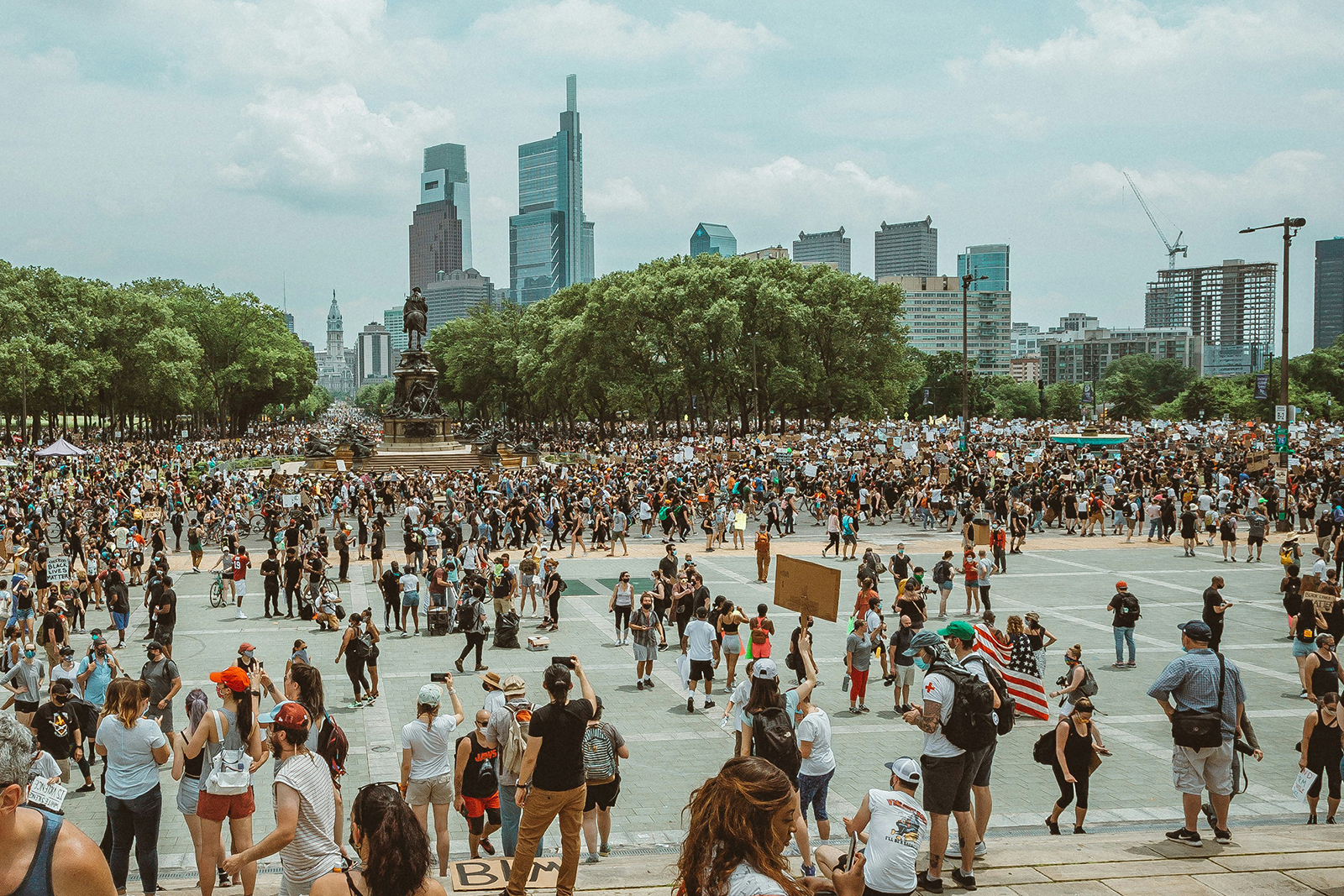
Large crowds demonstrate for racial justice in downtown Philadelphia in July 2020. (Photo by Chris Henry/Unsplash/Creative Commons)
But the uncommitted movement has left people uncertain of what to do in the general election now. This summer, before Biden dropped out, a report released by the Institute for Social Policy and Understanding, a Muslim research group, found that of Muslim voters in Pennsylvania, Michigan and Georgia who supported Biden in 2020, only 18% planned to vote for him in 2024. Overall, 61% of Muslim voters (74% of Arabs, 63% of Asians, 53% of whites and 38 % of Black Muslims) listed the war as their top concern.
Saher Selod, director of research at ISPU, said subsequent surveys have confirmed that Muslims are no more likely to vote for Harris. “This is the first time we’ve seen Muslims coalesce around a policy issue,” said Selod. “She has not demonstrated to the Muslim population a strong enough shift on the U.S. policy on Gaza.”
That may change as Trump continues to close the gap with Harris. Already, Emgage Action, the political arm of the advocacy group, endorsed Harris with a statement that read, “This endorsement is not an agreement with Vice President Harris on all issues, but rather, an honest guidance to our voters regarding the difficult choice they confront at the ballot box.”
But fear of Trump may not be enough to get Muslims to the polls. At the United Muslim Masjid, where Rashad serves as the amir, or CEO, more than a hundred Muslims flooded the tight streets after a recent Friday afternoon prayer. The mosque, founded three decades ago by music mogul Kenny Gamble, is also home to a charter school. The mosque is a mix of African American, African, Arab, South Asian and Asian Muslims.
Al Sharif Nassef, a senior campaign manager and Muslim community organizer in Pennsylvania for All Voting Is Local, a nonprofit that works on voting security for people of color and other marginalized groups, visits the mosque regularly. “There’s a disconnect between Muslim leadership in Philadelphia and the base of Muslims. And the base of Muslims is incredibly angry, dismayed at the scale of the violence that we’re seeing.”
Nassef said Muslims see that violence as “a function of our tax dollars. We recognize the role that we played in that, and we recognize that Democrats keep coming back to our community and they keep asking for our support. At this point, they haven’t earned our vote. And I think a lot of people feel that way. Including me.”
Quaiser Abdullah, the city’s Muslim engagement official, said that election season often prompts debates about the lesser of two evils, but choice this year is causing a rift between Muslims who believe they have no choice but to prevent a Trump presidency, and those who believe a vote for Harris is essentially a vote for genocide. “If you believe it’s a genocide, then it’s a genocide, right? There’s no in between,” said Abdullah.
Some, he said, will simply avoid the choice altogether. “Many of them are essentially saying that both main parties are essentially evil, so they are not going to vote.”
The battle in these final days is becoming personal, as well as a trial for the whole community. “How are we as a community going to be after Nov. 5?” said Abdullah. “That is the question we have to answer, because, right now, it is very intense.”
(This story was reported with funding provided by the Jonathan Logan Family Foundation.)
